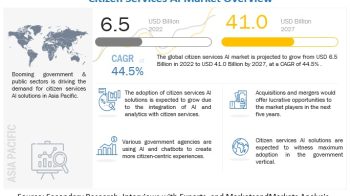
Digital transformation refers to the integration of digital technologies such as AI, ML, cloud computing, big data & analytics, mobility, and social media into all areas of the businesses, to fundamentally change how the businesses operate and deliver high value to their customers. These digital technologies facilitate the transformation of business process models and help increase revenue generation for end-user companies.
Major factors driving the Digital Transformation Market include digitalizing organizational business functions to serve changing customer preferences and enhance operational efficiency, the rapid proliferation of mobile devices and apps, increasing penetration of IoT and adoption of cloud services, and need to improve operational performance to gain competitive benefits in the market.
Over the years, the scope of digital transformation has widened with the adoption of modern technologies owing to changing customer preferences, the rapid proliferation of mobile devices and apps, increasing penetration of IoT, and adoption of cloud services. IoT technology will continue to develop as organizations web-enable their enterprise resources to achieve greater efficiencies and offer newer services. Therefore, the increasing trend of Internet usage and cloud services has significantly contributed to the growth of the digital transformation market.
The cloud sub-segment of the deployment type is expected to grow at the highest CAGR during the forecast period owing to the increased deployment of cloud-based digital transformation solutions. The deployment of digital transformation solutions on the cloud enables users to access solutions from their desktops or any mobile devices. Key advantages of this deployment type include easy deployment, low deployment cost, and easy upgradeability and accessibility. Furthermore, it helps reduce IT budgets and financial risks, while increasing flexibility.
Retail is one of the fastest-growing verticals with respect to the adoption of emerging and innovative technologies, such as cloud computing, big data analytics, DevOps, digital stores, and social networks. Some of the factors driving this adoption are the rise in purchasing power of customers and the need to satisfy customer expectations, which, in turn, lead to the retention of existing customers and new customer acquisitions. Presently, retailers use the web, e-commerce, and various applications to retain and attract their customers digitally.
Organizations have significantly changed the way they conduct their businesses by adopting advanced technologies, such as Artificial Intelligence (AI), Machine Learning (ML), Natural Language Processing (NLP), big data, and cloud computing. Advanced technology-featured digital transformation solutions offer customers significant benefits, such as productive analysis, virtual assistance, actionable business insights, digital customer collaboration, enhanced accuracy of data, and reduced operational cost. These technologies play a major role in enhancing customer satisfaction and streamlining business operations. Enterprises also utilize the support of cloud computing to set up robust digital transformation frameworks.
![[Latest 2028] Cloud Security Market Estimation, Key Players, Growth Opportunities](https://mnmblog.org/wp-content/uploads/2024/04/cust-350x196.webp)

